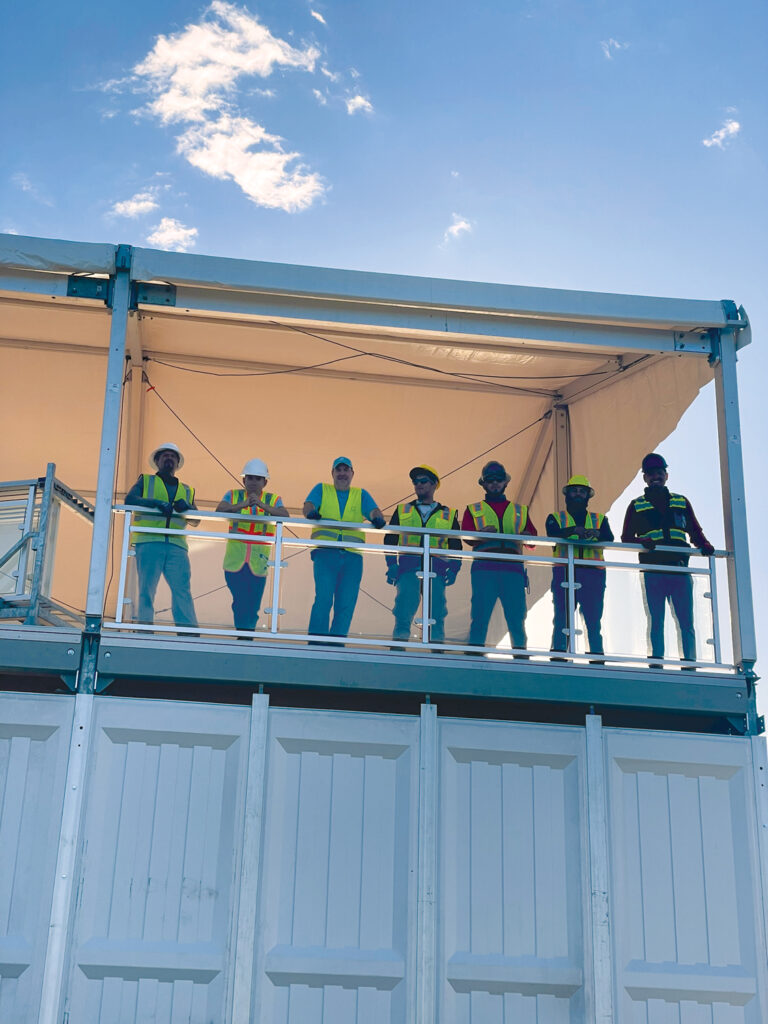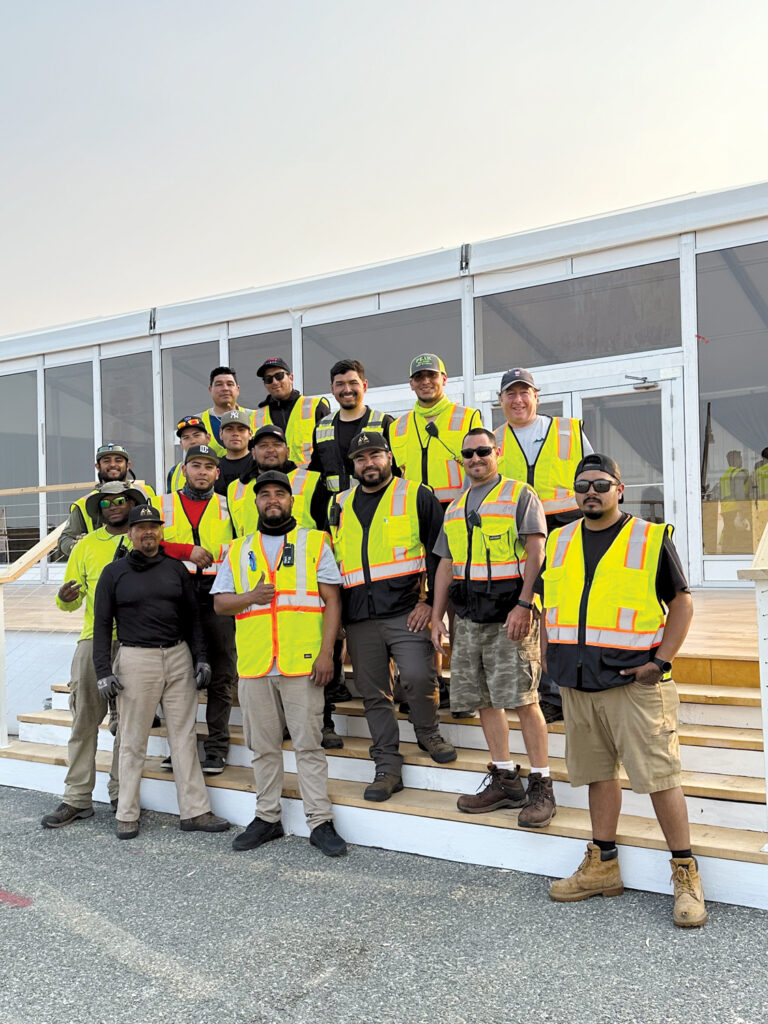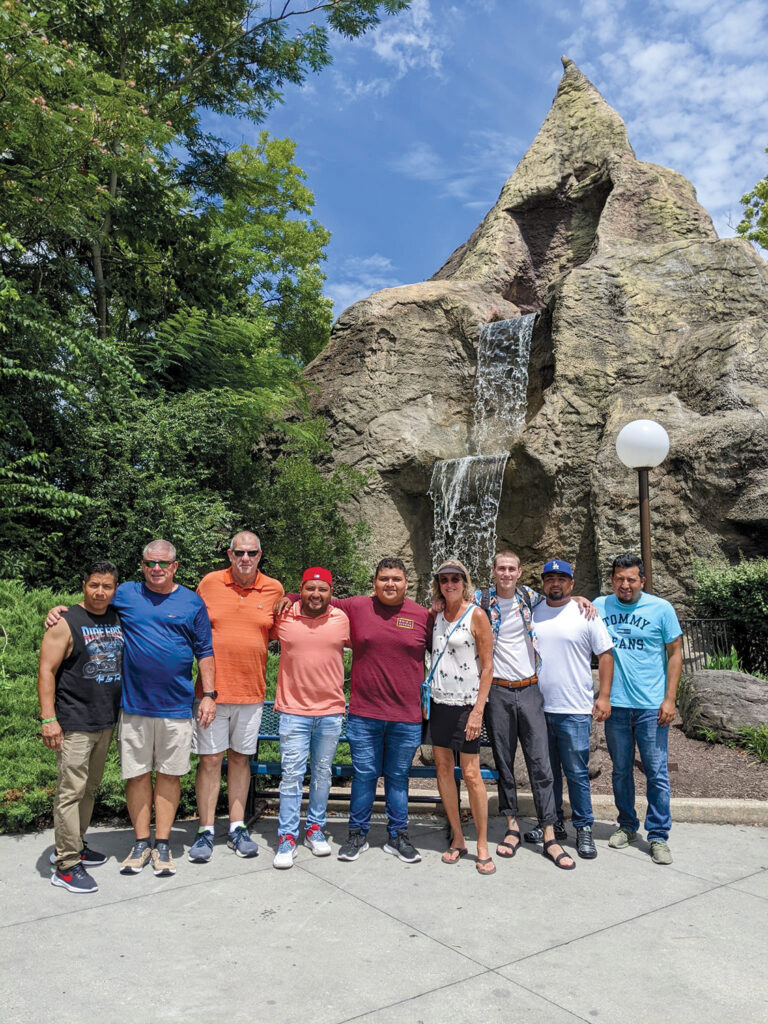
As the world adjusted to life during COVID restrictions, tents were in greater demand; however, finding people willing and able to take on the work during those early months of the pandemic was particularly difficult, says David Darby, wedding and event rental specialist at Colonial Heights, Virginia-based Rent-E-Quip.
Eli Tirado, tenting manager at South Jersey Party Rentals (SJPR) in Pennsauken, N.J., had the same issue. “It was extremely difficult,” he says. “You had a lot of people who were home. They had nobody watching the kids. That was keeping a lot of our main guys from coming back.”
Unable to bring back old workers, the companies focused on recruiting new ones. “It really came down to not being able to get help,” says Darby. “When we looked around the area and there were other unskilled labor jobs being offered at places like Amazon or Publix or different warehouses for $15 or $16 an hour doing work that wasn’t as hard, we ended up increasing our starting wages to $17 an hour to attract new employees.”
Tirado concurred. “Our pay rate had to change dramatically,” he says. “We started off at about $14 or $15 an hour for labor and jumped to $17, $18 and $19.”
Tarryn Prosper, vice president of sales in the tent division at PEAK Event Services in Woburn, Mass., says her company also had to raise wages. “Wage increases have varied by role,” she notes. “However, most [of our] wages increased 15%-30% post-pandemic.”
Rethinking the paradigm
Once things started opening up as the pandemic waned, all three companies say they found the recruitment process became easier with more candidates applying and a greater pool to choose from.
Nonetheless, with the industry now very much an employee-driven market, it takes more than just competitive wages to bring in the right people. Even though the industry is seasonal, most of these family-run businesses are looking to ensure their long-term success with loyal workers, whom they can invest in.
“Pre-COVID, we dealt with a lot of temp companies that were just hiring labor,” says Tirado. “After COVID, we kind of tweaked what we did. We didn’t just want to hire what we call a body, which is just labor. We wanted to hire people we could train” to become employees.
“We can be more selective now because we are now paying top dollar in our area for our workers,” he says. “Word of mouth gets around, and we use the most up-to-date equipment. We work smarter, not harder,” he notes. “In this area, I’d say we’re top in technology.” And that, he adds, is a big draw when it comes to new recruits.

“Our requirements for employees haven’t really changed,” says Darby. “There’s not a certain minimum skill set, for example, that’s required. We very much believe in taking people in and as long as they have the right mentality and the right personality, we can train them to do a lot of what we do.”
PEAK also kept its same hiring requirements pre- and post-pandemic, “but we have brought on board a full-time recruiter and automated the onboarding process to ensure qualified candidates are captured quickly,” Prosper says, adding the company also has adapted to hybrid work arrangements, post-COVID. As a result, PEAK now embraces virtual interviews and uses online platforms and job boards more extensively.
Darby says Rent-E-Quip did use job boards in the past but found they weren’t that effective. Rather, he says, “the most effective [recruitment tools] have been social media (Instagram and Facebook), as well as word of mouth.”
SJPR uses several agencies to find new recruits, “but they basically hire through the industry,” says Tirado. “We look for guys who have dealt with tenting. We do have to stay with the agency for about one season,” he says, but after that, “we can deal directly with the workers and hire them directly.” He adds that SJPR can then offer those people it wants full-time employment with benefits. “We say, ‘Now you have a home,’ which is what we try to offer everyone.”

Making employees feel like part of the family
Creating a sense of “home” is also something that each of these companies says is key to both recruiting and retaining employees. That includes competitive wages and great benefits packages. PEAK matches 401(k)s and offers full health benefits, including disability and life insurance. “We foster and embrace an inclusive and diverse work culture,” says Prosper. “Throughout our warehouse we display TVs showing photos from recent projects, safety and community messages, as well as thank-you notes from clients so everyone can see how they impact the event as a whole.”
The company also celebrates milestones and successes with employee recognition programs and a variety of company-wide celebrations throughout the year. “We believe in being immersed in our community and offer an annual volunteer/wellness day and a number of opportunities for our teams to support a variety of nonprofits throughout the year,” says Prosper. Its biggest program is PEAK Culture Week, which “is an important way for us to recognize and thank our employees for their hard work and dedication,” she adds.
Different items are given to staff each day during PEAK Week, including everything from branded swag such as hats, mugs and blankets, to supermarket gift cards. “In operations we will provide breakfast for the road crews and the leadership team will make breakfast for anyone who is in the warehouse,” Prosper says, adding that one year the CEO pushed a bar cart through the sales office and handed out mocktails to the team. “We try to make it fun and employee focused,” she says. “It’s a great way to bring people together and keep the energy up after the busiest times in the season.”
SJPR and Rent-E-Quip also offer life and health insurance, including dental and vision. “We have a bonus base too,” says Tirado. Darby shares that Rent-E-Quip offers generous holiday pay and a retirement plan, “which is a big deal to a lot of employees. There are other add-on programs like general accident insurance as well as life insurance that are available through the company.”
To build on that sense of family and home, SJPR holds an annual spring training, calling up workers right before the season starts. “It’s basically just getting their feet wet again and getting back into the flow of things, and we make a whole week of it,” he says. It’s also an excellent opportunity for SJPR to bring in new hires and make them feel like part of the family. During that time, SJPR includes videos and printouts with full training with everything from erecting a basic 10-by-10 pop-up tent to complex 40-foot tents.

At Rent-E-Quip, ensuring that the company is a fun place to work is key, says Darby. “We let our employees play music throughout the warehouse. We technically have a no cell phone policy at work, but if you’re just putting on Spotify to connect to your Bluetooth speaker and that makes it a little easier to get through the day, we say ‘go for it.’ We also have coffee stations located throughout the building.” These things may seem small, he says, but they help.
The company also does biannual or annual surveys for employees, depending on which department they are in. “With our different sections in the warehouse—either on the delivery crew or in the production sections of the warehouse—we ask them to rank or list the positions they’re most interested in; where they enjoy working and where they least enjoy working; as well as if there’s any additional skills that they have outside of work that they would like to use or if there’s a skill they don’t have but they would like to learn on the job,” says Darby. “We really try to instill in our employees that they’ll learn a diversity of tasks and skills that they can build on in the future.”
A challenging industry
PEAK has been in business for more than 70 years, SJPR for 26 years and Rent-E-Quip for 23 years. These companies clearly understand what it takes to be successful, and a crucial component is preventing employee turnover. Prosper believes it’s difficult because the industry itself is challenging, describing it as “highly customer focused and largely a seven-day-a-week business. Those dynamics are not always a fit for every lifestyle. At PEAK, we feel you really need to have a passion for people and excitement for events.”
Tirado agrees. “It’s the drive,” he says. “You have to want to do this type of work. When it’s busy, you don’t see your family; you basically see your coworkers. Some of them, of course, are money driven, but a lot of these guys really love what we do and they love the industry. I’ve got guys who have been in the company for over 15 years. It always comes back to the drive.”
Darby says three things are at play. “Either it’s an external situation that you can’t do anything about,” he says, “like families moving or needing to take care of a grandparent.” But the two main reasons, he argues, are employees being lured away by better pay or becoming burned out and wanting a less intense job.
“You have to listen to your employees, especially when they’re getting burnt out,” he says, if you don’t want to lose them. “And you absolutely have to increase wages. That can be scary because you then have to raise prices, but raising prices and keeping employees around, in my opinion, is a lot better than not raising prices and losing employees.”
He notes that every time Rent-E-Quip has increased wages, “we’ve attracted better talent, and nicer employees who end up having better experiences with the clients. And the clients keep coming back because of those better experiences, and when you increase your wages, you typically get more applicants and you can be more selective with who you keep around.”
For those in the industry struggling to both retain and recruit new workers, Tirado says the key lies in training your employees. “Keep them wanting,” he urges. “Don’t just throw them in a position that they feel they’re going to be stuck in forever. If you give somebody a ceiling, they’re going to reach it. So, keep them happy. Grow with them and don’t hold them back.”
Kelly Hartog is a freelance journalist in Los Angeles, Calif.
SIDEBAR: Embracing the generational divide
While many companies in the industry are comprised of family and close friends, bringing in “new blood” can yield real benefits, especially if it increases the company’s generational diversity. In fact, it’s so important that at Rent-E-Quip, wedding and event rental specialist David Darby says employee ages are “all over the board.” The majority are between 20 and 25, with sales team members between 40 and 60; the oldest employee “works part-time driving trucks just for fun, and he’s up towards 80. And our youngest are around 18, but we actually have one 16-year-old who works a few hours per week.”
Despite the range in ages and experience at the family-run company, Darby says the different generational groups overall work well together. “I think it’s an advantage to have the different generations and the different ways they all approach problems,” he says. “Traditionally, our delivery staff is a younger crowd, but when they talk to the people that are creating the logistics and the routes, seeing how they approach the different problems and different challenges is beneficial.”
Rent-E-Quip also carefully crafts its teams. “For example, on a delivery crew, we have more experienced workers go out with those with less experience,” says Darby. And while the company doesn’t have an official training program, Darby says leadership is in the process of formalizing a lot of procedures that encourage teaching and learning on the job. However, he adds, it’s not simply the older generation teaching the younger. “We have a lot of young 20-somethings that have been with us for six to eight years. Meanwhile, we’ll have somebody come in that’s 30. Even though they’re older, they may not have the experience of some of the younger people.”
Overall, Darby says things have been “smooth sailing” among the different generations, and part of the reason for that success, he says, comes down to having employees focus on a common goal. “We try to stress that whether you’re working for a charity, somebody’s wedding, a celebration of life, a gender reveal or a bridal shower, you’re helping on a very important day of somebody’s life.”
As a result, he says, “A lot of our employees end up taking pride in knowing they’re helping people, especially when they see the reactions from the guests and the photos after the events.”
At the end of the day, Darby says making sure all the different generations of employees find meaning in their work “is a common goal they can work toward. And even if they have differences or get into a little spat on a jobsite, it’s never at the expense of the job. They get the job done and then reconcile everything afterwards.”
 TEXTILES.ORG
TEXTILES.ORG


